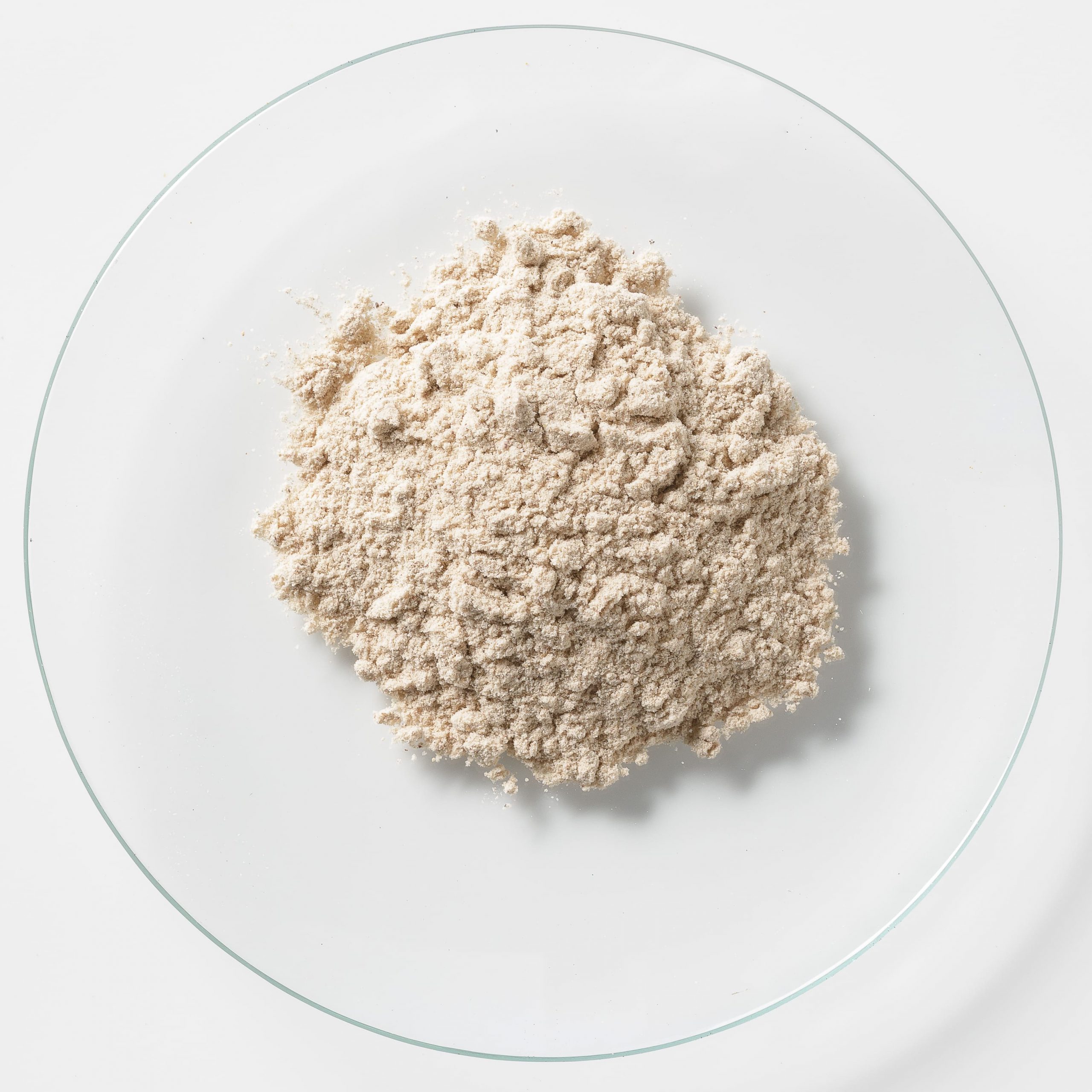Grain Koji Powder
Grain Koji Powder is a functional material made by fermenting seven different types of grains (Foxtail millet, Sorghum, Japanese
millet, Purple rice, Proso millet, Barley, and White Rice) with koji. We offer Grain Koji Powder 50M (koji strains kept alive), and Grain Koji Powder BF (sterilized type), – both powders show high enzymatic activity.
General Information
| Functions | ・Bowel movement improving ・Digestion and absorption improving ・Body fat accumulation suppressing |
|---|---|
| Form | Powder |
| Solubility | Insoluble in water |
| Content | Protease and α-amylase active |
| Form of delivery | Grain Koji Powder 50M: 10kg Grain Koji Powder BF: 1kg |
| Recommended intake | 500~600 mg/day |
※The information on this page is intended for people in the health food industry, and does not claim any effects or efficacy of the product.
Table of Contents
1. Development Story
1-1 Health Benefits of Koji
1-2 Grain Koji Powder- a food enzyme source
1-3 Production Path
2. Added Functionality
2-1 Food Enzymes Staibility
2-2 Digestion and Absorption Improvement
2-3 Bowel Movement Improvement
2-4 Body Fat Supression and Intestinal Flora Improvement
1.Development Story
- 1-1 Health Benefits of Koji
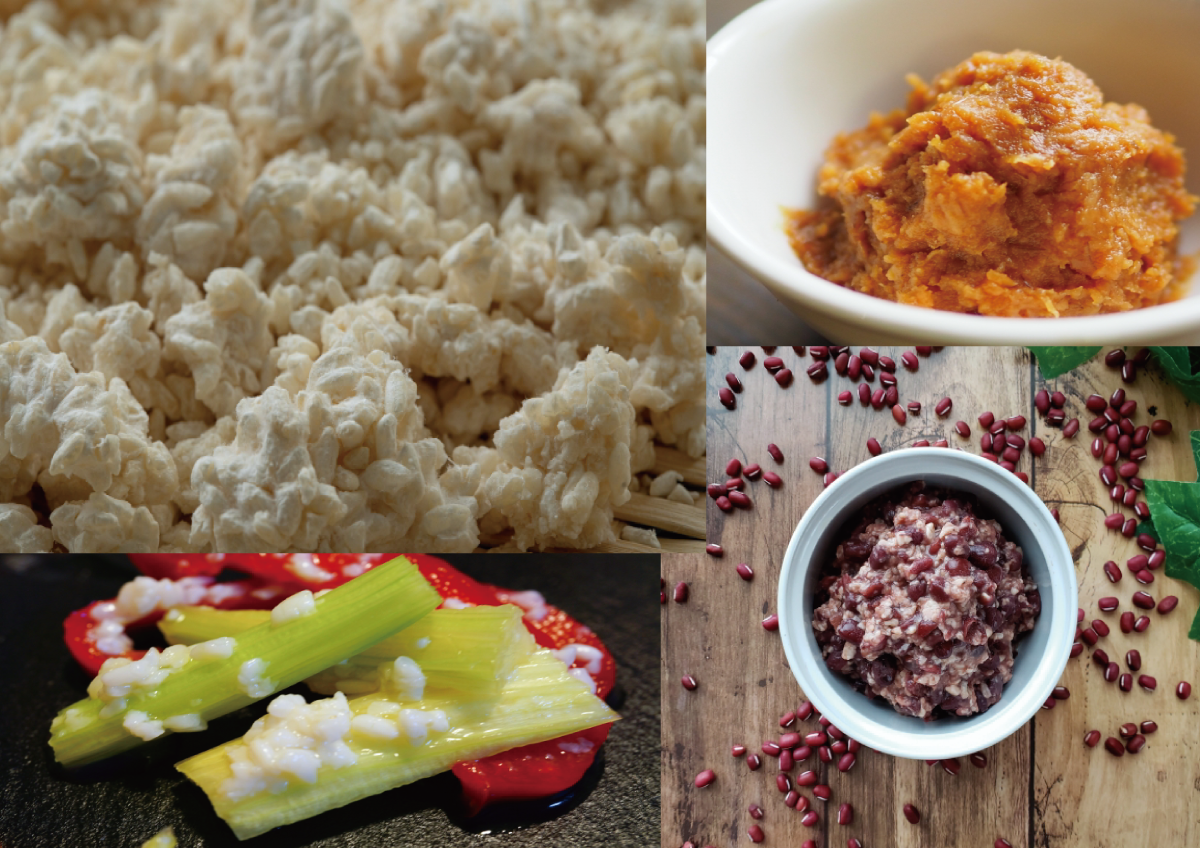
Koji is a type of mold that grows on cereals such as rice, wheat, and soybeans. Sometimes being called “good mold” Koji enhances the taste and nutrition content of food by fermenting it rather than spoiling . Fermented foods can be found all over the world, including blue cheese made from fermenting milk and tempeh — a fermented soybeans product. Among different types of mold koji stands unique and indispensable for the production of Japanese traditional fermented foods, it was even designated with a “national fungus” status in Japan.
The role of Koji is to improve food’s taste, smell, flavor and add functionality by converting the raw material ingredients with its innumerable enzymes.
- 1-2 Grain Koji Powder – a food enzyme source
After World War II people diets have changed towards high proportion of lipids and animal proteins, becoming richer and delicious. On the other hand, it also became clear that such eating habits can contribute to various lifestyle diseases. Due to high enzyme content, foods fermented with koji mold have long been used to improve digestion. Focusing on the above social background and the usefulness of Koji, Grain Koji Powder was developed as a food ingredient that helps digestion of animal proteins by fermenting 7 types of grains with Koji mold.
- 1-3 Production Path

2. Added Functionality
- 2-1 Food Enzymes Staibility
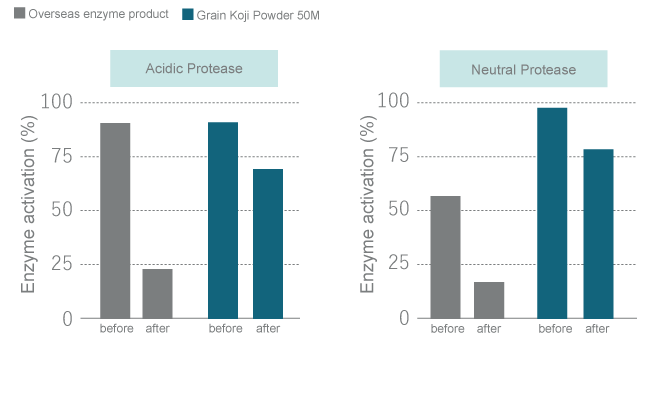
Grain Koji Powder has an excellent proteolytic effect. As shown in the graph on the left, accelerated tests have confirmed that there is less change in proteolytic enzyme activity over time compared to other company enzyme product.
- 2-2 Digestion and Absorption Improvement
| Trial substance | Total amino acid content (mg/L) |
|---|---|
| Casein | 39.6 |
| Grain Koji Powder 50M | 63.4 |
| Grain Koji Powder 50M + Casein | 6,280 |
When trial substances were reacted with artificial gastric juice (pH 1.2) for 2 hours at 37 °C, it was confirmed that protein degradation occurred only for casein mixed with Grain Koji Powder and that the enzyme activity of Grain Koji Powder was maintained in the artificial gastric juice.
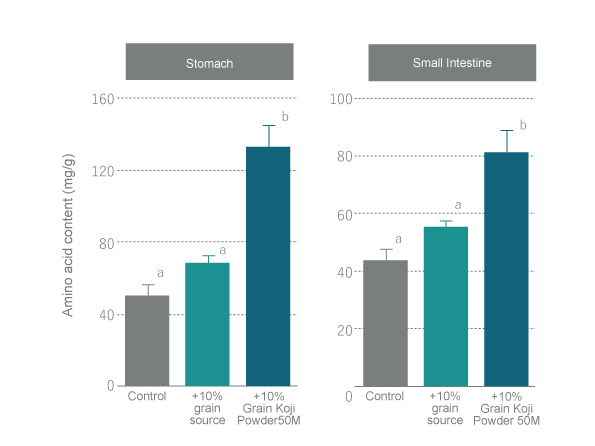
Increased amino acid content in mice stomach and small intestine was observed when either a 10% cereal diet was added to the normal mice diet, and even greater increased was shown after 10% Grain Koji Powder addition.
- 2-3 Bowel Movement Improvement
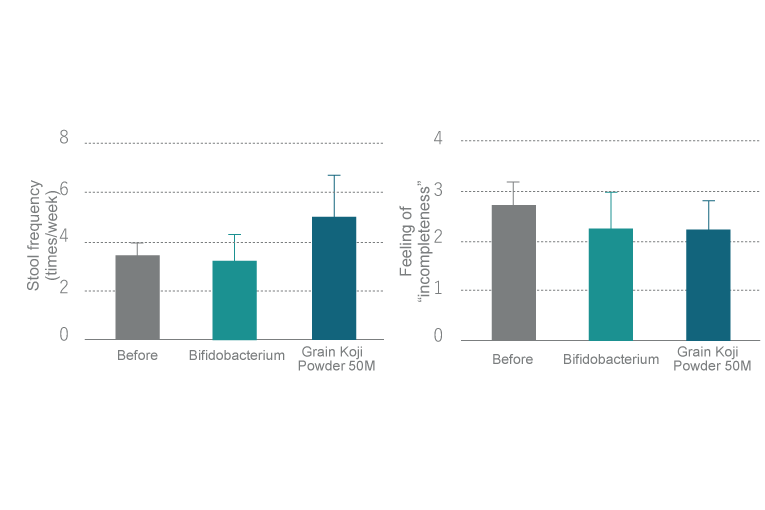
Trial Outline
Subjects with a bowel movement frequency of once every two days or less were used to investigate the effect of Grain Koji Powder on improving bowel movement. Compared to the bifidobacteria-treated group as a positive control, the number of bowel movements as well as afterwards sensation (sensation scale: 1 point – none, 4 points – unpleasant feeling) were evaluated before and after 2 weeks of trial intake.
| Subjects | 5 healthy people with constipation tendency |
| Trial samples | Bifidobacterium (40mg/day) or Grain Koji Powder 50M (500mg/day) |
| Period | 14 days |
| Procedure | Single-blind crossover study, 14 days of sample intake followed by a 7-day washout period and another 14 days of sample intake |
Trial Results
A clear trend towards an increase in the frequency of bowel movements and a better overall afterwards sensation was observed after the intake of Grain Koji Powder.
- 2-4 Body Fat Supression and Intestinal Flora Improvement
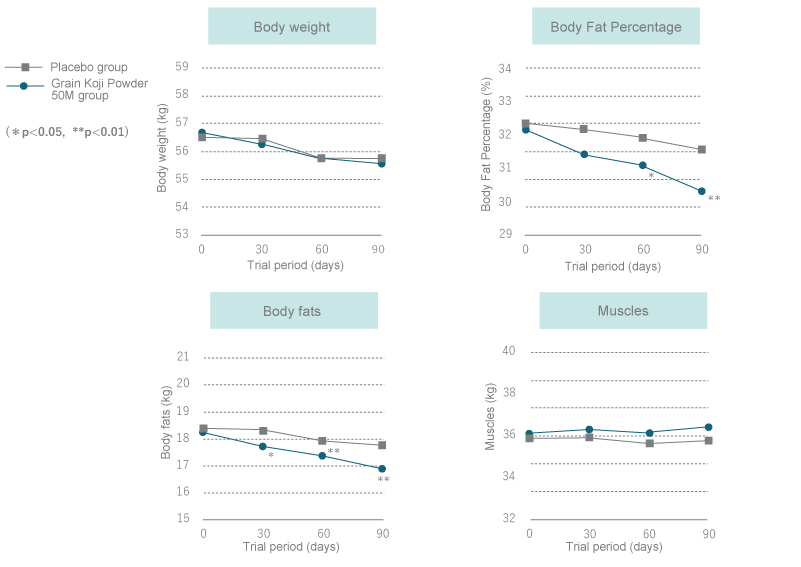
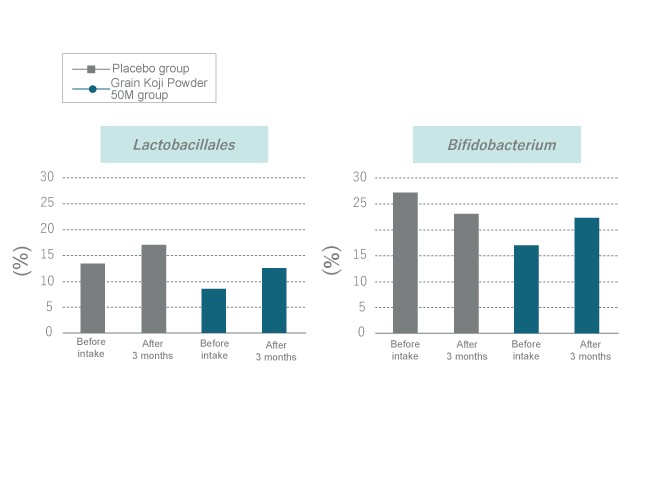
Trial Outline
A human intervention study was conducted to investigate the effect of Grain Koji Powder on body composition and changes in the gut microbiota of healthy people with a tendency towards obesity; a placebo-controlled study was conducted in healthy adult women with a BMI of 20 or more and a body fat percentage of 28%.
| Subjects | 20 females (10 people/group) (Healthy women with BMI of 20 and more and a body fat percentage of at least 28%) |
| Samples | Placebo group: enzyme-inactivated Grain Koji Powder 50M (3.0 g/day) Grain Koji Powder 50M group: mixture of Grain Koji Powder 50M (500 mg) and enzyme-inactivated Grain Koji Powder 50M (2.5 g) (3.0 g/day in total) |
| Period | 90 days |
| Procedure | Single-blind, placebo-controlled study 1) After splitting subjects into two groups of 10 people, their body composition was measured and stool samples were collected. 2) Trial samples were consumed once a day and body composition was measured one, two and three months after the trial start. Stool samples were collected after three months. |
Trial Results
Compared to the placebo group, there was a significant decrease in body fat percentage and body fat mass for the Grain Koji Powder 50M group, and a tendency for muscle mass to increase. In addition, intestinal microflora studies of stool samples showed that Lactobacillales and Bifidobacterium tended to proliferate after Grain Koji Powder 50M intake.
